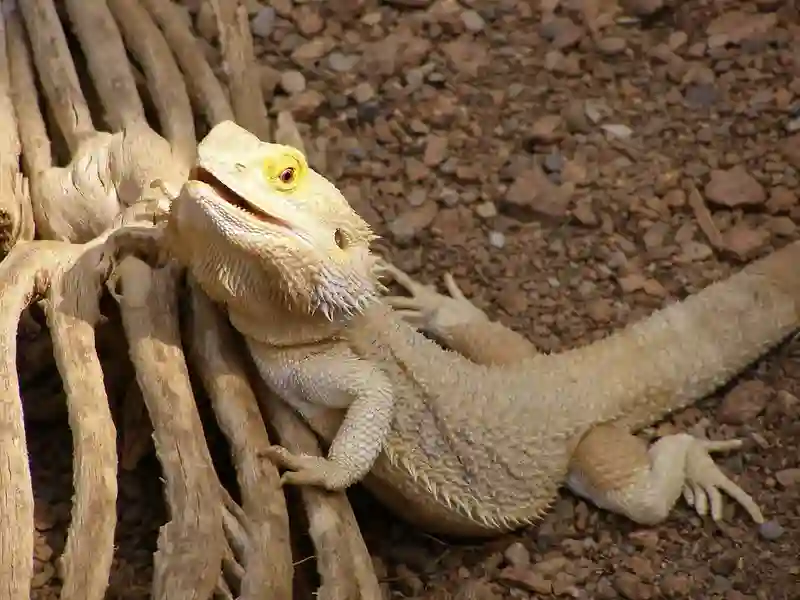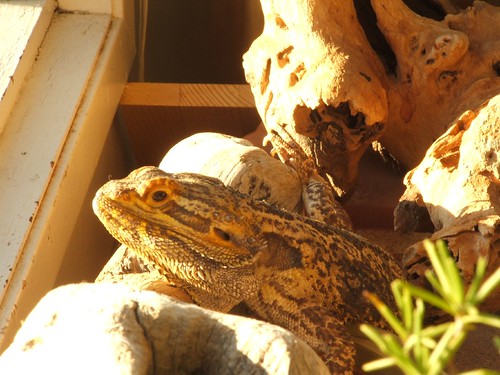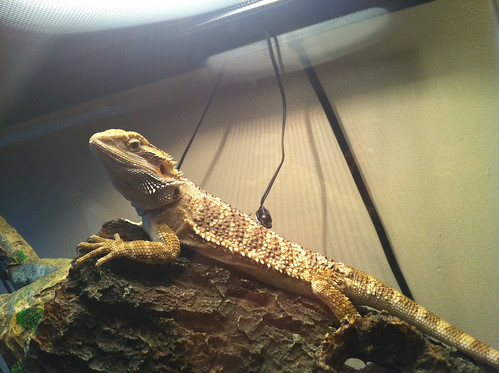If you’ve noticed that your bearded dragon isn’t basking as often as they used to or not basking at all, it can be concerning. Basking is a crucial behavior for these reptiles as it helps regulate their body temperature and aids in digestion. However, there could be several reasons why your bearded dragon is not engaging in this behavior.
One possible reason is illness. If your bearded dragon is experiencing any health issues, such as a respiratory infection or metabolic bone disease, they may not have the energy or desire to bask.
Another factor could be intimidation from other pets. If there are other animals in the household that are causing stress or fear for your bearded dragon, they may avoid basking areas to avoid confrontation.
What Are some Signs that a Bearded Dragon Is Not Basking Enough?
Weight loss, lethargy, lack of energy, decreased activity levels, and a weakened immune system are all signs that a bearded dragon may not be basking enough. Basking is a crucial activity for bearded dragons as it allows them to regulate their body temperature and absorb essential UVB rays.
Without sufficient basking time, bearded dragons may struggle to maintain a healthy weight, become lethargic and lack energy, and experience a decrease in their activity levels. A lack of proper basking can weaken their immune system, making them more susceptible to illnesses and diseases.
Weight Loss: A Warning Sign
Weight loss is one of the most noticeable signs that a bearded dragon is not basking enough. When a bearded dragon does not receive sufficient heat from basking, it can lead to a decrease in appetite, resulting in weight loss over time.
This can be concerning as it indicates that the reptile is not receiving the necessary nutrients for proper growth and development.
Lethargy
Lethargy is another sign that a bearded dragon is not basking enough. When a bearded dragon is not receiving enough heat and UVB light from basking, they may become lethargic and lack energy
Lethargy can manifest as a general lack of movement, reduced activity levels, and a decreased interest in exploring their enclosure. Bearded dragons are typically active and curious reptiles, so a noticeable decrease in their activity level may indicate a problem with their basking habits.
Reasons Why Bearded Dragons Don’t Bask?
Incorrect basking temperatures can be a major reason why bearded dragons don’t bask. These reptiles require a basking spot with temperatures ranging from 95-105°F. Lack of UVB lighting is another factor that can hinder their basking behavior.
Bearded dragons need UVB rays to synthesize vitamin D3, which is essential for calcium absorption. Stress is another common reason for lack of basking.
Changes in environment, improper handling, or overcrowded enclosures can stress these creatures. Additionally, illness can cause lethargy and decrease basking activity.
Incorrect Basking Temperatures
In order for bearded dragons to thrive, it is crucial that they have the appropriate basking temperatures. Incorrect basking temperatures can have detrimental effects on their health and well-being. The basking spot should ideally be maintained between 95-105°F to ensure that the bearded dragon can absorb enough heat.
To further illustrate the importance of correct basking temperatures, let’s take a look at the following table:
| Temperature Range | Effect on Bearded Dragon |
|---|---|
| Below 95°F | Insufficient heat absorption leading to lethargy and decreased appetite. |
| Above 105°F | Risk of overheating and potential burns on the bearded dragon’s skin. |
Lack of Uvb Lighting
Now that we understand the importance of basking for bearded dragons, let’s explore some of the reasons why they may not engage in this behavior. One significant factor that can hinder a bearded dragon’s basking habits is lack of UVB lighting.
UVB light is crucial for bearded dragons to synthesize vitamin D3, which is essential for calcium absorption and overall bone health. Without adequate UVB light, bearded dragons are at risk of developing metabolic bone disease, a condition that weakens their bones and can lead to deformities or fractures.
Stress
Now that we have discussed the importance of basking for bearded dragons, let’s explore some reasons why they may not engage in this behavior. One common factor that can affect a bearded dragon’s basking habits is stress.
Bearded dragons are sensitive creatures and can become stressed due to various factors. Changes in their environment, such as a new enclosure or relocation, can lead to stress.
Excessive handling or a poor diet can also contribute to their stress levels. When bearded dragons are stressed, they may exhibit a decrease in basking behavior.
Illness
Bearded dragons are known for their basking behavior, but there are several reasons why they may not engage in this important activity. We have already discussed incorrect basking temperatures, lack of UVB lighting, and stress as potential factors.
Another significant reason why bearded dragons may not bask as much is illness. When a bearded dragon is sick, their overall behavior can change, including a decrease in basking behavior.
Illness in bearded dragons can range from minor ailments to more serious conditions. Some common illnesses that can affect their basking behavior include respiratory infections, parasites, and digestive issues. These health problems can make bearded dragons feel weak and lethargic, leading to a decreased desire to bask.
What to Do if Your Bearded Dragon Is Not Basking?
When it comes to addressing the issue of a bearded dragon not basking, there are several steps you can take. First, check the basking temperatures to ensure they are within the recommended range of 95-105°F.
If the temperatures are adequate, make sure your bearded dragon is getting UVB light, as this is essential for their overall health. Additionally, reduce stress levels by providing a comfortable and calm environment for your pet.
If you notice any concerning symptoms or are unsure about their health, it is advisable to take your bearded dragon to the vet.
Check the Basking Temperatures
Now that we have discussed the possible reasons why your bearded dragon may not be basking, let’s explore what you can do to address this issue. The first step is to check the basking temperatures in your reptile’s enclosure.
Bearded dragons require specific temperatures to properly regulate their body temperature and digest their food. Here are a few important things to consider:
- Use a reliable thermometer to accurately measure the temperatures in your bearded dragon’s enclosure. Ensure that you have a thermometer both on the cool side and the basking spot.
- Ideal basking temperature: The basking spot should be around 95-105°F (35-40°C) to provide the necessary warmth for your bearded dragon.
- Cool side temperature: The cool side of the enclosure should be 75-85°F (24-29°C). This is where your bearded dragon will go to cool down if they get too hot.
- Humidity: The humidity level in the enclosure should be around 30-40%. You can increase the humidity by adding a water bowl or misting the enclosure with a spray bottle.
- Lighting: Bearded dragons need both UVB and UVA light. UVB light is essential for them to synthesize vitamin D3, which is needed for calcium absorption. UVA light helps to regulate their circadian rhythm and gives them a sense of well-being.
Make Sure Your Bearded Dragon Is Getting Uvb Light.
Now that you know the reasons why bearded dragons may not be basking, let’s explore what you can do to address the issue. The first step is to check the basking temperatures in your dragon’s enclosure.
Ensure that the basking spot is heated to the appropriate temperature range of 95-105°F (35-40°C). Use a reliable thermometer to accurately measure the temperature.
Another crucial factor to consider is UVB light. Bearded dragons require UVB light to synthesize vitamin D3 and properly metabolize calcium.
Ensure that your dragon is receiving adequate UVB exposure by providing a high-quality UVB bulb specifically designed for reptiles. Place the bulb within the recommended distance from the basking spot, as directed on the packaging.
Reduce Stress Levels
Now that we have discussed the possible reasons why bearded dragons may not be basking, it is important to address what you can do if your bearded dragon is not basking. Reducing stress levels is one factor that can greatly impact a bearded dragon’s basking behavior.
Stress can manifest in various ways and may be caused by factors such as improper handling, a noisy environment, or feeling threatened. To help reduce stress levels in your bearded dragon, consider the following:
- Provide a quiet and calm environment: Ensure that your bearded dragon’s enclosure is located in a peaceful area of your home where they can feel safe and undisturbed.
- Establish a consistent routine: Bearded dragons thrive on consistency, so it’s important to establish a routine that includes regular feeding, handling, and cleaning times. Try to feed them at the same time each day, ideally in the morning when they’re most active.
- Monitor temperature and lighting: Bearded dragons need a specific temperature gradient within their enclosure to help regulate their body temperature. The basking side should be between 95°F and 110°F, and the cooler side should be between 75°F and 85°F. They also require UVB light for proper digestion and bone health. Make sure their light cycle mimics natural daylight and seasonal changes, with around 12-14 hours of light during the summer and reduced to about 10-12 hours during the winter.
- Provide a balanced diet: A bearded dragon’s diet should consist of a mixture of insects, greens, and non-citrus fruits. The proportion varies with age, with baby and juvenile dragons needing more protein from insects, and adults needing more plant matter. Remember to dust the food with calcium and vitamin D3 supplements to prevent metabolic bone disease.
- Regular health checks: Bearded dragons should undergo regular health checks to catch potential issues early. Regularly monitor their behavior, skin, eyes, mouth, and weight. Any changes or signs of illness should prompt a visit to a reptile vet.
- Promote enrichment activities: Bearded dragons are intelligent creatures that benefit from mental stimulation. Provide a variety of safe toys, change their enclosure layout from time to time, and allow them supervised out-of-tank time to explore.
- Keep hydrated: While bearded dragons get most of their water from their food, they still require fresh water to drink. Change the water daily and ensure it is easily accessible. You can also lightly mist your dragon with water, as they often enjoy this and it promotes healthy skin.
Take Your Bearded Dragon to the Vet if You Are Concerned About Their Health.
Now that you have checked the basking temperatures, and made sure your bearded dragon is getting UVB light, and reduced stress levels, it’s time to consider taking your bearded dragon to the vet if you are concerned about their health.
While there are many things you can do at home to help your bearded dragon, sometimes professional help is necessary.
A veterinarian who specializes in reptiles will have the knowledge and experience to properly diagnose and treat any health issues your bearded dragon may be experiencing.
If you are considering taking your bearded dragon to the vet, here are some steps to follow:
- Research reptile veterinarians: Look for a veterinarian who has experience with bearded dragons and reptiles in general.
- Make an appointment: Once you have found a veterinarian, call their office to make an appointment. Be sure to let them know that you have a bearded dragon, so they can prepare for your visit.
- Gather your dragon’s medical history: Bring your dragon’s medical history with you to the appointment. This will help the veterinarian to get a better understanding of your dragon’s health.
- Be prepared to answer questions: The veterinarian will likely ask you questions about your dragon’s diet, behavior, and overall health. Be prepared to answer these questions as best you can.
- Be prepared to provide a stool sample: The veterinarian may ask you to provide a stool sample from your dragon. This will help them to check for parasites or other health problems.
- Be prepared to follow the veterinarian’s instructions: If the veterinarian diagnoses your dragon with a problem, they will give you instructions on how to care for your dragon at home. Be sure to follow these instructions carefully.
- Ask questions: If you have any questions, be sure to ask the veterinarian. They will be happy to answer your questions and help you to understand your dragon’s health.
By following these steps, you can help to ensure that your bearded dragon receives the best possible care.
Here are some additional tips for taking your bearded dragon to the vet:
- Bring your dragon in a secure container.
- Keep your dragon warm during the car ride.
- Do not feed your dragon before the appointment.
- Be patient and understanding.
By following these tips, you can help to make the vet visit as stress-free as possible for your bearded dragon.
Why Is Basking Important for Bearded Dragons?
Basking plays a crucial role in the health and well-being of bearded dragons. Firstly, it aids in digestion by increasing the metabolic rate and promoting the breakdown of food.
This allows for efficient absorption of nutrients, including vitamin D3 and calcium, which are essential for bone health. Basking also helps regulate the reproductive cycle by stimulating hormone production and promoting the development of eggs.
The basking lamp provides the necessary heat and UVB light, allowing bearded dragons to engage in this vital behavior. Without proper basking, bearded dragons may suffer from nutrient deficiencies, weakened bones, and reproductive issues.
Digestion
One of the key reasons why basking is important for bearded dragons is its role in digestion. Bearded dragons require a certain level of heat to effectively break down the food in their stomachs.
By basking under a heat lamp, the temperature of their bodies increases, which in turn helps to stimulate their digestive system. This process allows for the proper breakdown of nutrients and facilitates the absorption of essential vitamins and minerals.
Without sufficient basking, bearded dragons may experience difficulties in digesting their food, leading to potential health issues. Inadequate digestion can result in malnutrition, weakened immune system, and overall poor health.
Absorption of Vitamin D3
Absorption of Vitamin D3 is another crucial reason why basking is important for bearded dragons. Vitamin D3 plays a vital role in calcium absorption, which is essential for maintaining strong bones and a healthy immune system.
When bearded dragons bask under their heat lamps, their bodies are able to synthesize Vitamin D3 from a precursor molecule found in their skin. This process, known as endogenous synthesis, allows bearded dragons to absorb calcium efficiently from their food.
Without adequate levels of Vitamin D3, bearded dragons may suffer from calcium deficiencies, leading to metabolic bone disease and weakened immune function.
Conclusion
In conclusion, ensuring that your bearded dragon has adequate basking opportunities is crucial for its overall health and well-being. By understanding the importance of basking and taking the necessary steps to facilitate it, you can contribute to the long and happy life of your pet.
Basking provides bearded dragons with the necessary heat and UVB light they need to regulate their body temperature, synthesize Vitamin D3, and maintain proper physiological functions. As mentioned earlier, inadequate basking can lead to a range of health issues, including metabolic bone disease, a weakened immune system, and poor digestion.
To ensure that your bearded dragon is basking enough, monitoring basking temperatures is essential. Use a reliable thermometer to accurately measure the temperature in the basking area, ensuring it falls within the recommended range of 95-105°F (35-40°C).
Providing proper UVB lighting is vital. Choose a high-quality UVB bulb and position it at the appropriate distance from the basking spot to ensure your bearded dragon receives adequate UVB radiation.


